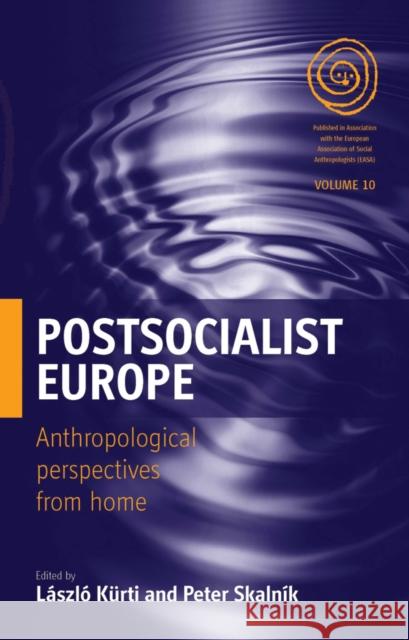Postsocialist Europe: Anthropological Perspectives from Home » książka
Postsocialist Europe: Anthropological Perspectives from Home
ISBN-13: 9780857451576 / Angielski / Miękka / 2011 / 336 str.
The major contribution of the volume lays in its rethinking of the postsocialist paradigm from an insider's perspective. By taking a longue duree perspective on their societies, contributors explore cultural, political, and economic transformations, revealing the complex interactions between global processes and specific localities. Their scholarship prove, . if still necessary, that Central and Eastern European anthropology is thriving both at home and abroad. JRAI This book may be a pioneering endeavour, not only in the study of anthropological changes in the heart of Europe, but also for Central European socio-anthropological research. It is nearly impossible to compare this to other books in this field as it is truly an innovative work and acts as a source of inspiration for additional research and the deepening of discussion on existing materials. Central European Journal of International and Security Studies ...all these case studies presented are fascinating, covering as they do often little or unresearched topics...This collection should be interesting for people engaged in East European studies. Journal of Ethnology and Folkloristics Seeking to dispel the myth that Eastern European anthropology is parochial and centered on folkloric research, the volume showcases rich ethnographies that spell out the connections between local and global processes and provide insight into new social hierarchies and marginalities. Anthropos Now that nearly twenty years have passed since the collapse of the Soviet bloc there is a need to understand what has taken place since that historic date and where we are at the moment. Bringing together authors with different historical, cultural, regional and theoretical backgrounds, this volume engages in debates that address new questions arising from recent developments, such as whether there is a need to reject or uphold the notion of post-socialism as both a necessary and valid concept ignoring changes and differences across both time and space. The authors' firsthand ethnographies from their own countries belie such a simplistic notion, revealing, as they do, the cultural, social, and historical diversity of countries of Central and Southeastern Europe. Laszlo Kurti has taught anthropology at the American University, and Eotvos University in Budapest, and presently teaches at the University of Miskolc. He has conducted fieldwork in the US, Romania and Hungary. His books include: Beyond Borders (1996, co-edited with J. Langman), The Remote Borderland (2001), Youth and the State in Hungary (2002), and he served as co-editor for Working Images (2004). Peter Skalnik currently teaches social anthropology at the University of Pardubice. He was the Czech ambassador to Lebanon (1992-1997). He has edited or co-edited: The Early Writings of Bronislaw Malinowski (1993), The Post-communist Millennium: The Struggles for Sociocultural Anthropology in Central and Eastern Europe (2002), Anthropology of Europe: Teaching and Research (2004), Studying Peoples in the People's Democracies: Socialist Era Anthropology in East-Central Europe (2005).
The major contribution of the volume lays in its rethinking of the postsocialist paradigm from an insiders perspective. By taking a longue durée perspective on their societies, contributors explore cultural, political, and economic transformations, revealing the complex interactions between global processes and specific localities. Their scholarship prove,. if still necessary, that Central and Eastern European anthropology is thriving both at home and abroad. JRAI
This book may be a pioneering endeavour, not only in the study of anthropological changes in the heart of Europe, but also for Central European socio-anthropological research. It is nearly impossible to compare this to other books in this field as it is truly an innovative work and acts as a source of inspiration for additional research and the deepening of discussion on existing materials. Central European Journal of International and Security Studies
...all these case studies presented are fascinating, covering as they do often little or unresearched topics...This collection should be interesting for people engaged in East European studies. Journal of Ethnology and Folkloristics
Seeking to dispel the myth that Eastern European anthropology is parochial and centered on folkloric research, the volume showcases rich ethnographies that spell out the connections between local and global processes and provide insight into new social hierarchies and marginalities. Anthropos
Now that nearly twenty years have passed since the collapse of the Soviet bloc there is a need to understand what has taken place since that historic date and where we are at the moment. Bringing together authors with different historical, cultural, regional and theoretical backgrounds, this volume engages in debates that address new questions arising from recent developments, such as whether there is a need to reject or uphold the notion of post-socialism as both a necessary and valid concept ignoring changes and differences across both time and space. The authors firsthand ethnographies from their own countries belie such a simplistic notion, revealing, as they do, the cultural, social, and historical diversity of countries of Central and Southeastern Europe.
László Kürti has taught anthropology at the American University, and Eötvös University in Budapest, and presently teaches at the University of Miskolc. He has conducted fieldwork in the US, Romania and Hungary. His books include: Beyond Borders (1996, co-edited with J. Langman), The Remote Borderland (2001), Youth and the State in Hungary (2002), and he served as co-editor for Working Images (2004).
Peter Skalník currently teaches social anthropology at the University of Pardubice. He was the Czech ambassador to Lebanon (1992-1997). He has edited or co-edited: The Early Writings of Bronislaw Malinowski (1993), The Post-communist Millennium: The Struggles for Sociocultural Anthropology in Central and Eastern Europe (2002), Anthropology of Europe: Teaching and Research (2004), Studying Peoples in the Peoples Democracies: Socialist Era Anthropology in East-Central Europe (2005).











